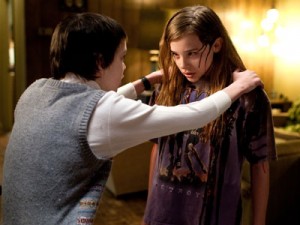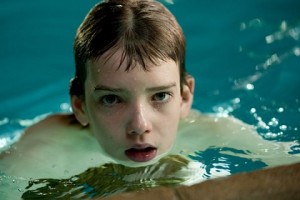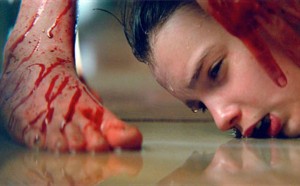Let Me In
 At the end of the late ‘80s teen movie, My Best Friend is a Vampire, the titular night walker, as played by future House star Robert Sean Leonard, is confronted in a cemetery by his parents. He’s accompanied by a very androgynous girl, and his parents are devastated because they don’t want their son to be gay, which they’ve confused with his vampirism the entire movie. Fortunately, he reassures them, he’s not gay, and boy, are they relieved. The implication throughout the scene is that it’d be a lot worse if he were gay, and that being a vampire is somehow preferable*.
At the end of the late ‘80s teen movie, My Best Friend is a Vampire, the titular night walker, as played by future House star Robert Sean Leonard, is confronted in a cemetery by his parents. He’s accompanied by a very androgynous girl, and his parents are devastated because they don’t want their son to be gay, which they’ve confused with his vampirism the entire movie. Fortunately, he reassures them, he’s not gay, and boy, are they relieved. The implication throughout the scene is that it’d be a lot worse if he were gay, and that being a vampire is somehow preferable*.
Such backwards thinking personified a lot of 1980s culture, in both good ways and bad. Matt Reeves’ Let Me In, which takes place in the middle of nowhere New Mexico in 1983, and is the remake of the recent Swedish film Let the Right One In, seems to cover most of them. Children had more freedom and could make friends who they would be shielded from now. But without the constant presence of security, cameras, and societal paranoia, it was also a lot easier for criminals to get away with serious felonies, such as stealing cars, robbery, and murder. Bullies also had free reign, not just to make fun of those they picked on, but to beat them up too. There was simply less of an attempt by parents to connect emotionally with their children, which both allowed for a child to explore their creativity, but also to be ignored, never being given a moral center to emulate.
 Let Me In has Owen, a 12 year-old loner, being picked and beaten on by a group of three kids, one of whom especially has a violent streak obviously covering his own discomfort with his sexuality. It also has Abby, also 12, theoretically, who walks around barefoot in the snow, and feeds on human blood. She’s therefore quite hesitant about becoming close to anyone, especially Owen who is apparently the only other child in the complex they live in. No one takes notice that Abby nor her “caretaker” are vampires for quite some time, no matter how many local bodies pile up. This disconnect is key to the film, if it took place in the present day, the complex would be quarantined for being the most violent place on the earth, per capita.
Let Me In has Owen, a 12 year-old loner, being picked and beaten on by a group of three kids, one of whom especially has a violent streak obviously covering his own discomfort with his sexuality. It also has Abby, also 12, theoretically, who walks around barefoot in the snow, and feeds on human blood. She’s therefore quite hesitant about becoming close to anyone, especially Owen who is apparently the only other child in the complex they live in. No one takes notice that Abby nor her “caretaker” are vampires for quite some time, no matter how many local bodies pile up. This disconnect is key to the film, if it took place in the present day, the complex would be quarantined for being the most violent place on the earth, per capita.
 One of Reeves’ masterstrokes is the way he deals with how separate everyone’s lives are, it allows Abby and Owen to bond, without any suspicion arising amongst the adults until it is way too late. Reeves shoots the film from Owen’s perspective, the camera is rarely more than a few feet from him, uncomfortably close and almost always at head level. There seems to be a deliberate nod to Steven Spielberg’s E.T. not just from having the movie made from the child’s perspective, but the way Owen is so clearly modeled on Elliott and not just because he has a constant hankering for a brand name candy (Now & Laters vs. Reeses Pieces) or because of Owen’s hair and style of clothing**. Spielberg shot E.T. using the same low angles and adults were clearly second rate in terms of perspectives. Reeves does this as well, the adults, like Elias Koteas as a local cop, mustached and designed to look like Robert De Niro, or Owen’s mother, have as much influence on the film as they would in a John Hughes film or a Peanuts cartoon.
One of Reeves’ masterstrokes is the way he deals with how separate everyone’s lives are, it allows Abby and Owen to bond, without any suspicion arising amongst the adults until it is way too late. Reeves shoots the film from Owen’s perspective, the camera is rarely more than a few feet from him, uncomfortably close and almost always at head level. There seems to be a deliberate nod to Steven Spielberg’s E.T. not just from having the movie made from the child’s perspective, but the way Owen is so clearly modeled on Elliott and not just because he has a constant hankering for a brand name candy (Now & Laters vs. Reeses Pieces) or because of Owen’s hair and style of clothing**. Spielberg shot E.T. using the same low angles and adults were clearly second rate in terms of perspectives. Reeves does this as well, the adults, like Elias Koteas as a local cop, mustached and designed to look like Robert De Niro, or Owen’s mother, have as much influence on the film as they would in a John Hughes film or a Peanuts cartoon.
 The camerawork is so integral to the film’s success because Owen is seeing and hearing all of these things for the first time (even the fancy rack focuses and lens flares aren’t distracting), the sound design is downright David Lynchian in its use of industrial noises, and his innocence makes the movie seem like he’s not being corrupted by Abby, but learning, maturing, and socializing. Their relationship is frankly sweet and disarming (and the vampires as junkies angle isn’t an annoying diversion, just another layer that Owen doesn’t get***), there’s no nudge-nudge irony between them (a relief considering Abby is played by Chloe Moretz, who was recently encased in irony in Kick-Ass). Not that Reeves avoids interrupting the proceeds, since he throws in a bunch of groan-worthy on-the-nose jokes (well, that KISS Army joke isn’t too bad), puns, and snarky smash cuts (as Owen is leaving the house to misbehave, his mom is asleep on the couch, and the TV says “It’s 10PM, do you know where your children are?”).
The camerawork is so integral to the film’s success because Owen is seeing and hearing all of these things for the first time (even the fancy rack focuses and lens flares aren’t distracting), the sound design is downright David Lynchian in its use of industrial noises, and his innocence makes the movie seem like he’s not being corrupted by Abby, but learning, maturing, and socializing. Their relationship is frankly sweet and disarming (and the vampires as junkies angle isn’t an annoying diversion, just another layer that Owen doesn’t get***), there’s no nudge-nudge irony between them (a relief considering Abby is played by Chloe Moretz, who was recently encased in irony in Kick-Ass). Not that Reeves avoids interrupting the proceeds, since he throws in a bunch of groan-worthy on-the-nose jokes (well, that KISS Army joke isn’t too bad), puns, and snarky smash cuts (as Owen is leaving the house to misbehave, his mom is asleep on the couch, and the TV says “It’s 10PM, do you know where your children are?”).
Maybe Reeves felt he had to dumb the movie down a little and make it more accessible, but it’s actually a much less interesting film when it remembers it’s a horror film. It’s an ambitious movie precisely when it slows down**** and allows us to feel Owen’s isolation, his visibly cold breath is an almost metaphorical gasp for love and acceptance.
 * Like Eddie Griffin’s character in Deuce Bigalow: European Gigolo, who’d rather be known as a serial killer than be known as gay.
* Like Eddie Griffin’s character in Deuce Bigalow: European Gigolo, who’d rather be known as a serial killer than be known as gay.
** E.T. was released in 1982 and there’s no doubt that if Owen were a real person, it would have had a major influence on him.
*** Like most horror films that have young leads, the themes of puberty/menstruation are everywhere, and although the brutal CGI-aided attacks are not always convincing, they don’t literalize the subtext.
**** Reeves previously directed Cloverfield, which was produced by J.J. Abrams, and you could tell their styles locked horns (though I’d say that Cloverfield does as well with the limited concept, as could be expected). Abrams directed Star Trek and Mission Impossible III, both hyper-edited headaches. Let Me In is a patient film, with long takes and a camera that seems to be curious as to what it will discover. It’s as confident and technically assured as any mid-budget studio film since the heyday of M. Night Shyamalan.



